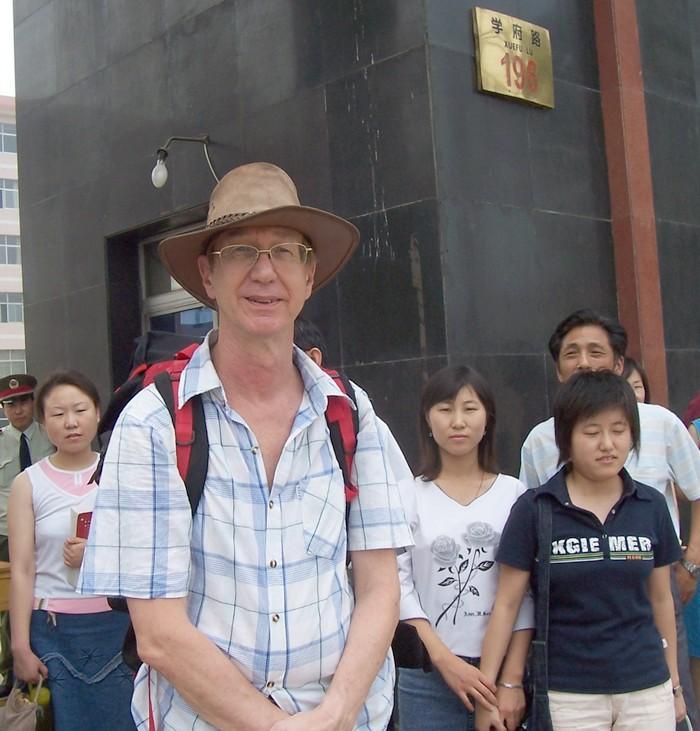| Everything hikes except salary!!! | |
|---|---|
| Sep 20, 2007 15:16 | |
 | ...but after reading all what you had to say, I would tend to sympatyze with the poor, and let's not lie to ourself here: the average Chinese people with no salary increase for years now while the inflation gets to record highs: 6.5% in August is quite high and IS NOT closing any gap here.... Here's a read on the subject: http://paper.sznews.com/ This is a really big issue facing China for the next several years so is the alarming pollution issues.... Less money to afford the bear minimum like food, no water to supply towns, worst health and reduced life expentancy...future doen't look to bleek...it's hard to stay optimistic. I just hope that the gouvernment will out its foot down and start charging industries for every single drop a pollution they create and take that money and built waste water treatment plants and redistribute the rest among the poorest not in the pockets of its gouvernement employees. I might be a dreamer, but I know that I'm not the only one ;-P / AL |
| Sep 20, 2007 18:16 | |
 | Of course you are not alone AL, the questions you are rising are really interesting why not creating a topic on the forum ? Then we can talk about it. But for what is about the question here, I mean the price of the food, it means that more and more people can buy it so the price increases. Of course this company made a very questionable choice, and its reaction shows the links that exist between the state and the major Chinese companies. Though, I think the prices shall rise here, after all, a nice inflation rate is often the parallel to a growing Economy. However, unfortunately this growth will not profit to the poorest, or just a bit. When Chinese companies will get less competitive on the international market they ll worry about redistributing the money to their employees, but this as you can imagine, won't happen tomorrow. |
| Sep 24, 2007 00:02 | |
 | OK, maybe my remark about water, pollution and life expectancy was a little off-topic, but this was to prove my point that maybe the solution will have to come from the gouvernment in some mean.... I don't think that it should regulate every product sold, but in the case of basic food like milk, grains, etc. this could be benefic for the poorest part of the population. For the rest (like tv sets and other "luxuries") I fully agree that the market laws with sort things out by itself...eventually. I was also trying to find an alternative source of revenue for the population: tax on pollution would be a nice way to force the companies to give back some of their revenue to the people and force them to respect the environment in the first place. No offense Erentius, but I don't agree with some of your arguments: "When Chinese companies will get less competitive on the international market they ll worry about redistributing the money to their employees": --> When they will get less competitive, they will either close, buy machinery that works 24hrs a day and that is cheaper than labor or move to something (or somewhere) else: NOT give more to their employees. "... the survey you are talking about is not correct. Why do I think so ? Because Chinese people have never been consuming so much as they are doing today. But to consume, you need money..." ---> The survey says that goods are more expensive and that the salaries (gouvernement paid in this case) are not increasing as fast or at all. Your argument: it's because the Chinese buy more from their savings. Well, poor people do not have savings!! The higher consomation rates you refer to is in big part due to the rich people and the fact that the population grows; you proved it (or contredicted) yourself when you said: "To do so you need a really great number of rich people at least as numerous as the poor ones to double the prices. Sounds impossible to me especially for noodles: the consumption of it doesnt increase proportionaly with your wealth (rich or not you are human your body is physically limited) contrary to TV sets or computers". ---> widening income gap refers to revenues vs price of things; not only gap between poors and rich. And let's not mix things up between higher consomation rates and basic food needs and prices. People do not eat more rice because they use their savings and yes the big spending numbers mostly reflect rich people luxury spending, increasing investments, capital gains from insane stock market and population growth. The "nice inflation rate" your talking about is hypothetical: did you read the link I gave?: record highs! ...and it has been so for the last 10 to 15 years: what about the rise of salaries???? ---> that was mainly the topic of the post. |
| Sep 24, 2007 01:13 | |
 | One thing that has been lost in this long and (truly) meaningful discussion is that the labour market is also subject to the rules of supply and demand and peoples' evaluation of what they value If the Ms Wang you qouted has not had a pay rise for 4 years that is for one of 2 reasons. 1. She prefers to accept a lower paid job and stay where she is instead of moving finding a higher paid job. 2. She does not have the skills that another employer wants for which itwould pay a higher wage. Having said that, I still believe that workers need trade unions or government regulations which provide them with real protection as employers are exploiters - exploiters of their economic strength. I know of no developed country which is as pro employer and has so little protection for the worker as this one, I am sad to say. But of cousre this will all change when China is able to fully implement its socialist policies. |
| Sep 24, 2007 03:36 | |
 | Quote: in the case of basic food like milk, grains, etc. this could be benefic for the poorest part of the population. For the rest (like tv sets and other "luxuries") I fully agree that the market laws with sort things out by itself...eventually. Al32, I could not agree with you any more on this point. To ensure their poor people can feed their faces is the least thing that the government can do. Otherwise, social unrest may occur. Some experts suggest that China should impose the environment tax on those enterprises. I think this is similar with the pollution tax as you mentioned. Hope the government can consider this suggestion carefully. |
| Sep 24, 2007 05:42 | |
 | Al I guess you didn' t get what I said: "But to consume, you need money, and if it increases it means otherwise Chinese saved a lot and are spending what they saved, otherwise the have other sources of revenu. Noone can buy more with the same amount of money, especially in a context of rocketing inflation." This sentence means that if they have no savings where does the money come from ? From a soaring revenu... Of course poor people do not have any savings, it was exactly what I meant. Quote: "When Chinese companies will get less competitive on the international market they ll worry about redistributing the money to their employees": --> When they will get less competitive, they will either close, buy machinery that works 24hrs a day and that is cheaper than labor or move to something (or somewhere) else: NOT give more to their employees. Why did I just said this: imagine that you are less competitive on the foreign markets, what will you do if you have a 1.4 billion inner potential market but still undeveloped? You wont replace people with machine, because investment needs money and takes time you ll be replaced on the international market faster than you can upgrade your industry. However if you increase the wages of your employees you create a potential demand so you can try to take advantage of your situation. Higher salaries ----> more market opportunities. On the point "widening income gap refers to revenues vs price of things; not only gap between poors and rich. And let's not mix things up between higher consomation rates and basic food needs and prices. People do not eat more rice because they use their savings and yes the big spending numbers mostly reflect rich people luxury spending, increasing investments, capital gains from insane stock market and population growth." That's what I said: no matter you are rich or poor, your consumption of food is the same so... the inflation on this product cannot be linked to the widening income gap. Which means: they have higher revenu and the company abused of her monopoly status. |
| Sep 24, 2007 05:48 | |
 | And do you really think that local governments will reduce the profits of the companies they have in their provinces asking for more taxes? I don't think so though I agree on this point. Environement is a major issue that has to be dealt with. |
| Sep 24, 2007 13:04 | |
 | It is very hard to get into the mainstream of this discussion as it has become so broad, so many issues have been raised. I find myself agreeig with one writer against another, the the reverse. Then thinking of another point but the discussion has moved on. What to do, 'say nowt'? No, anyone who kows me knows that is not an option. Maybe just a few comments.... :) The population as a whole has massive savings. There has been great fear amonst the older peopl that hard times will return so they saved even though many had little enough to live on. Only now are they beginning to have faith in the Chinese economy having durability so it MIGHT be supplementing their wages. Some of that money has gone to the stock market and some into speculative housing develpment. The rich are getting richer and the poor poorer??? That is not what I see in China. The first part is definitely true, but I don't believe the poor are getting poorer even though they are not getting rich as fast as others. I base this comment on the amount of development I have seen in rural areas and the lifestyles of the urban working classes. Industrialisation seems to succed in capitalist societies because the entreprenneurs have large profits to risk on further ventures. Those profits are made on the back of the working class (or the 'common people' if you like). China is no exception though it seems to me that the poorer sections are generally faring better than in previous economic take-offs. It would be greaty if a socialist society could endsure the working class did not suffer at all, but that is probably just too difficult in practice. (And remember the words of Karl Marx 'Philosophers only interpret the world, the point is to change it'. Theory is great but we need action and that action may not match the theory. Yes, DXP got it started, and as he said, we can fix the problems later... I observe with interst :) ) Workers' wages are low because we have 'job sharing', to borrow a western term. In the stores there are so many staff doing nothing, in government it is the same. In a college I and my national colleagues teach a piddling maximum 12 hours a week (called 16 hours in China as an hour = a 45 minte class in this terminology. We could reduce staff in most businesses by say 35% and pay the remaining staff more and still have enough left fr more profit. This is one of the areas that second stage growth will come from, greater workforce productivity. In the meantime it allows far more people to share in the growth and fewer unemployed...the gap betwen the employed and the unemployed is the real income gap. Well I said I would just make a few comments.... fortunatly the word 'few' is a very flexible word in the English language :) |
| Sep 24, 2007 18:53 | |
 | I mostly agree with you Paul, I would just add to this sentence "the gap betwen the employed and the unemployed is the real income gap", that this gap also exists between the coast and the countryside. Indeed Chinese revenu is increasing, if you increase the productivity, tough you ll make a selection between people creating unemployement for some people, you will, as a counterpart, increase the incomes for the most productive ones. So for now inflation can be related to savings and to higher incomes. |
| Sep 25, 2007 00:17 | |
 | Paul: don't feel bad about expressing yourself please; we like long answers, even broad discussions, and counter-argumentations...!!! That said, I will also "try" to be short here in replying to Erencius again...sorry man! ...hehe! >> "This sentence means that if they have no savings where does the money come from ? From a soaring revenu... Of course poor people do not have any savings, it was exactly what I meant." You're saying the same thing again: ~"they (population) are spending more; so it means they are paid more": ---> NO!! there is no direct link there --> it could be only due to the rich people spending more or like I said: increasing investments, capital gains and population growth. How can you so eaily affirm that higher spendings absolutely means that salaries are higher?; that: "inflation can be related to savings and to higher incomes" ?? ---> High inflation could also mean that there is more money circulating and that the demand for goods is increasing; not necessarily that people earn more. There are more Mercedes-Benz on the streets, but more people now have no other choice than to eat plain rice. You don't think that this is a possibility???? >> "However if you increase the wages of your employees you create a potential demand so you can try to take advantage of your situation. Higher salaries ----> more market opportunities." ---> this is definately NOT how companies think nor a viable business solution: you don't pay your employees more hoping for them to buy more. You can never stimulate a business revenues (or the economy in general) by giving more to your employees. This argument is totally wrong. --> they will then start saving not return it back to the company (especially in China!!).... Back to economics 101: if you want to sell more, lower the prices; if you want to keep same profit with lower selling prices; lower your cost ---> and that does NOT mean pay your employees more. If you want to improve what you called "inner market" the same rules apply as for the export market: you have to be competitive and always strive to lower your costs. If like in the example of noodles, your raw material goes higher, what is left to lower?: salaries. PLEASE explain me more about how increasing salaries can do anything good to any business because I really don't see... |
Post a Reply to: Everything hikes except salary!!!








 Copyright © 1998-2026 All rights reserved.
Copyright © 1998-2026 All rights reserved.